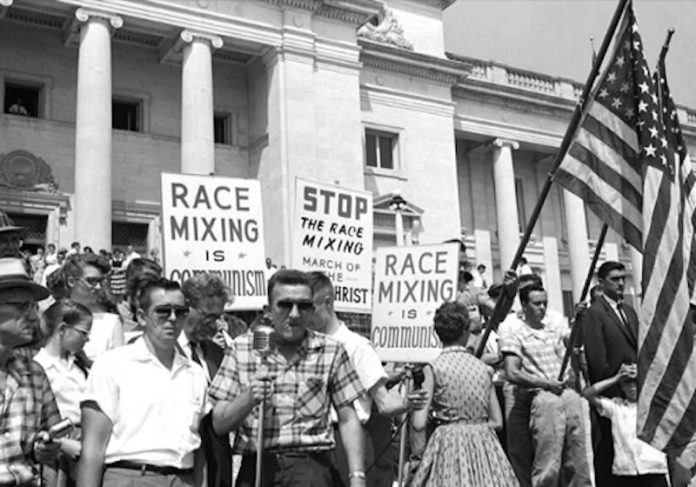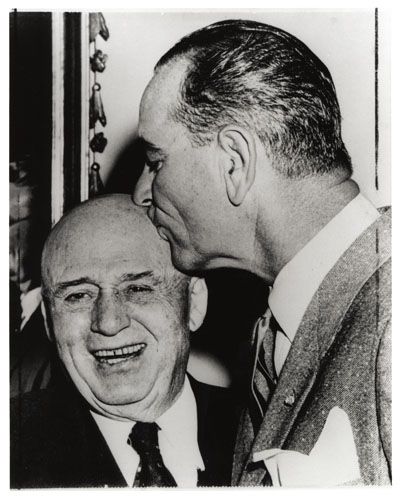
Photo: Courtesy of the African American Civil Rights Movement
In March 1956 the elected leaders of the Southern states pledged to defend school segregation, despite civil rights pressures and Supreme Court rulings demanding racial reforms. The authors of the “Southern Manifesto” pressured elected officials to sign on to its Jim Crow rhetoric, promising to mobilize angry mobs of White voters against anyone who defied. Nineteen U.S. senators and 82 members of the U.S. House of Representatives signed the segregationist pledge. Most Southern governors and local officials voiced their support as well.
Historians have documented how the pressure to pledge support for segregation eliminated the space for compromise: you had to be either for segregation or against it, nothing in-between. Many elected officials caved to the fear of alienating white voters.
Gov. Greg Abbott’s “Back the Blue” manifesto re-plays this terrible history. After repeated examples of police brutality toward citizens of color, and overwhelming evidence that the criminal justice system treats citizens of color in prejudicial ways, the governor has chosen to defend the status quo and bully elected officials to follow his lead. He demands that elected officials pledge “to support any measure that discourages or stops efforts to defund police departments in Texas.”

Photo: Gage Skidmore via Wikimedia Commons
Any measure? Really? How is this different from segregation at any cost? How is this different from the intentional silencing of civil rights claims in the Southern Manifesto?
Abbott’s measure, in fact, is straight out of the Jim Crow playbook. The governor wants to overturn reforms approved unanimously by the Austin City Council to cut about $20 million – or 5 percent — from the police department’s $400 million budget next year. The city also plans to explore ways to fully fund traditional police patrol service, but reorganize other public safety programs, including mental health, forensics labs and family crisis intervention, outside of direct police control.
In retaliation, Abbott’s proposal would freeze the city’s property tax authority and, while details remain few, further envisions the state seizing full control of Austin’s police services.
Why is Abbott demanding this pledge of support for such draconian action from elected officials? He offers no pledge on racial justice or police reform of any kind. Like the Jim Crow politicians of 1956, the governor is trying to polarize debate into a question of whether you are “for” or “against” the police, with no room for compromise and reform in-between. The echoes of “segregation now and forever” are obvious.
Two great Texans were among the very few Southern officials who refused to sign the Southern Manifesto in 1956: Speaker of the House Sam Rayburn and Senator Lyndon Johnson.

Photo: Courtesy of the Dolph Briscoe Center for American History, University of Texas at Austin
They were not full-throated supporters of integration. They believed in maintaining some elements of segregation, at least for the moment. But they refused to accept the stubborn defense of the status quo at all costs, without necessary reform. They refused to reject the legitimate civil rights claims by citizens of color.
Rayburn and Johnson pursued “racial moderation” – an effort to maintain the institutions of the South, but also reform them to improve public safety, racial equality, and freedom for all. In the decade after the racist promulgation of the Southern Manifesto, Rayburn and Johnson succeeded, producing the most far reaching civil rights legislation in recent American history. Among other things, Johnson and Rayburn began the process of desegregating schools and police departments in Texas. Rayburn and Johnson succeeded because they avoided extreme pledges of loyalty, and built diverse coalitions to serve shared needs. They worked closely with people who favored one side or the other, and many in-between.
Reform, improvement, and equality require a commitment to compromise and change, in the interest of all citizens. Pledges to protect the status quo at any cost set everyone back. They are the worst of Jim Crow’s legacy in the South. Instead of signing pledges to support “any measure” for the police or any other institution, we need commitments to work together in ways that will reform our flawed institutions to increase safety and freedom for everyone.
Gov. Abbott: please rewrite your pledge to erase the Jim Crow language, and embrace reforms that make our police better, with protection and dignity for all of our diverse citizens.
If you like what you’ve been reading, please click here to subscribe and we will send you updates and our newsletter.






There seema to be a disconnect on how the two issues are related. More substance is needed to help make the connection. Also, it seems like the city council made a knee jerk decision without a real plan. Kind of like what they did with the homeless issue. They find money, but squander it often with little results. Maybe this is one of the causes of concern from the governor.
Thanks for your comment, Chris. The connection between Jim Crow opposition to school integration in the 1950s and Governor Abbott’s opposition to police reform today is two-fold. First, in both cases there is an intentional silencing of the other side. Segregationists refused to talk about the suffering of African-American children in inferior schools. Today, Governor Abbott refuses to talk about the suffering of minority communities at the hands of the police. We have seen what happened to George Floyd, Breonna Taylor, Jacob Blake, and Mike Ramos here in Austin. The refusal to address these and other incidents, and the pain they caused for so many people, is racist. Abbott talks about the pain incurred by the police and their largely white supporters, but not the pain of others. Second, according to polling most Texans want to support some police reforms for racial justice. The bullying behind the governor’s pledge forces politicians to choose one side or the other. And most politicians will choose the status quo, dominated by white wealthy voters. The same was true in the 1950s on segregation. Many Southerners were racial moderates, but they were bullied to choose one side. Fear and coercion by state leaders encouraged racial extremism in the 1950s as it does today. And the language is similar today — opposition to “any measures” that bring black kids into our schools or force the police to address brutalization of black and brown citizens. Again, I think most citizens support both the police and reforms for racial justice. The governor should use his power to pursue reforms and compromises in that space, not encourage extremes, fear, and racism. If you want more sources on Jim Crow in the 1950s, and its many echoes today, let me know. Numerous scholars have written about this. Thanks, Jeremi
The Austin City council has made a long string of poor decisions that continue to put the Austin taxpayers at risk, causing the Governor to step in. Starting with housing and homeless policies that have caused the streets to be be overrun with homeless, causing a driving safety issues for motorists and homeless alike, as well as general public health and safety issues. Now, defunding an already undermanned police force puts private citizens in danger. Just weeks ago the posture and decisions of the Austin City council almost led to protestors taking over the police headquarters. If the Governor had not sent in the DPS officers, it very well could have happened. Saying that supporting our officers to protect us equals Jim Crowe laws is a far jump off a short bridge. Governor Abbott would not have to step in if the City Council and mayor would do their job and talk about real reforms with adequate training and support of the officers, and not just pulling funds from their budget to fund unrelated social programs like abortion access.
Thanks for your comment, Greg. I will not comment on City Council policies regarding homelessness and housing because I do not have any expertise on those issues. I am a historian who writes about politics, social movements, state force. I try to write about what I have studied. And I have studied how governors and senators in the South used bullying language to scare away reformers of schools, police departments, etc. in the 1950s. Governor Abbott is using these exact tactics in his call for a “pledge” to support “any measures” that protect the status quo. We can and should support good police officers. And we need an effective police force (as well as fire and EMS.) You and I agree on those points. But, our police must address the overwhelming evidence of racial inequality. George Floyd, Breonna Taylor, Jacob Blake, and Mike Ramos here in Austin. The evidence of disproportionate mistreatment of people from communities of color cannot be ignored. What are the police doing about it? Governor Abbott’s intentional silence on these obvious issues is a replay of his predecessors’ silence on the suffering of black and brown children in segregated schools during the 1950s and 1960s. A real leader, who is not playing to Jim Crow attitudes and practices, would step forward to call for serious police reforms and funding for those reforms. Not just the status quo. The status quo that Abbott defends includes systemic racism. If you wish more sources on the continuing legacies of Jim Crow attitudes in the criminal justice system, please let me know. There is a huge body of scholarship on this topic. Thank you for your comments. Have a nice weekend. Jeremi
Jeremi,
As a historian, you should also know that you should not look at policies and actions in a vacuum. There are many linked events it the chain that have led up to this action but the Governor.
Also, as a historian, you should disclose that you are also married to one is the city council members. I learned this after I read your article. Your “historical analysis” is really proof texting support propaganda of the Austin City Council.
Thanks for your comments, Greg. As you agree, historians write about context. That is the point of my piece — the long and powerful context of racism, segregation, and Jim Crow in Texas. Why are you trying to deny that context?
I am, of course, married to Alison Alter. That is public knowledge (stated on my Facebook page, for example.) I am also a professor and historian of politics, policy, and race. My article reflects my research, writings, and scholarship. Some city council members might know their history better than others, but my piece is a researched piece of scholarship. If you have a problem with my research, that is fine. Whom I am married to does not affect the quality of the scholarship, just as it does not affect the quality of your work, I presume.
SO sick of anti American Liberal loons
I am the child of immigrants, and I love America; it saved my family. I love America because we strive to be a society where “all are created equal” and all have access to “life, liberty, and the pursuit of happiness.” If you defend Jim Crow attitudes, and continued mistreatment of the vulnerable, then you are the one who does not love America.
Excellent analysis, Jeremi. I so appreciate your call for Governor Abbott to acknowledge that while we need to support good police officers, we must (and can simultaneously) embrace reforms to address racial inequality.